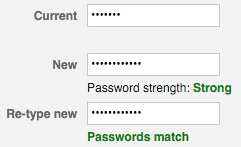This post is part of the Blog March 2017. Every day this month a different blogger is writing about politics. Please march along with us!
A personal drumbeat of #resistance
A friend of mine recently commented that she'd like to get more involved in the resistance. She had attended a march or two, but those were occasional and spur of the moment activities. She asked if I had advice about how to turn her occasional activism into something more sustained? In other words, how could she make more of a difference but not quit her job and dedicate her life to the resistance?
I thought back to the 1990s when I was much more involved in politics. I was involved in multiple organizations but I still had a full time job. Was there something I could suggest? Activism is very different today than it was back then (we met in person and sometimes sent faxes!)
Times have changed but what works is still the same: Create a personal drumbeat of activism in your life.
A personal drumbeat sets that cadence for your work. It sets you up to do a little work each week. Over time this amounts to a lot of effort. However it doesn't feel like a lot because you've done a little at a time. More importantly, whatever you do becomes easier the more you repeat it.
For example, suppose you decided that your personal activism cadence would be to call 1 representative every Tuesday morning at 10am. The first time might be difficult, but the second time it a lot easier because you know who to call, and what to say. The third time you are a pro. Soon you can make two calls in the same amount of time. A call each week is going to generate more calls than if you make calls... when you think of it. Even a single call each week is better than, say, occasionally calling or planning to call but not actually doing it.
If everyone contributed 1 more hour per week to the resistance, we could achieve anything! This is very different than the old days before social networks. Back then efforts had to be more centralized (i.e. committees) because we didn't have mass communication tools like Facebook and Twitter. Now we can get more done with everyone doing little bits of work because it is easier to reach more people.
When has the resistance been successful?
If you look at Trump's first 100 days, you'll see that 100 percent of the resistance's victories involved an outpouring of people.
Public support is like oxygen for an issue. Without it the movement dies, with it the movement has a chance to see another day.
The huge numbers at The Women's March told Democrats in D.C. "we've got your back!" and gave them the confidence to put up a fight. Without their new-found backbones, they would not have stood up to Trump's policies at all.
The courts had the confidence to knock down the hate-fueled Muslim ban because crowds of people flooded airports and protested.
Trump failed to kill the ACA because of the outpouring of Democrats that showed up at townhalls and other venues as recommended by the Indivisible Handbook. Blue-state Republicans were terrified of not being reelected (basically the only thing that motivates them). In fact, the ACA repeat didn't even make it out of committee because the chair, NJ-11 Representative Rodney Frelinghuysen, has been dogged by constituants relentlessly (and by "relentlessly" I mean appropriately, politely, and never backing down). Keep up the good work, NJ11!
This brings me to 3 suggestions for setting up your personal drumbeat:
Technique 1: Set aside a specific time and place
Set aside the amount of time that is right for you. It can be five minutes each morning, once a week, or once a month. Something is better than nothing. Pick what is comfortable for you.
One day I realized that I wasn't making any progress on an important project. There was always a reason to put it off. I'd be invited to do something Monday night, and I'd say to myself, "It is ok. I'll work on that project on Tuesday." Tuesday I'd get home from work and be too tired to work on it. That's ok, I'll work on it Wednesday. You can guess where this is going. Soon it is Monday again and I've missed another week.
To fix this I set aside one night as my designated night just to work on that project. I picked Tuesday. If someone invited me out on Tuesday night, or if my boss asked if I could work late, I could honestly say, "no, I have a prior committment."
Nobody has time for big projects. People only make time for big projects. You have to say "no" to a lot of things to create the time for a big project. Creating an excuse (like, "Tuesday is my activism night") is one way to force yourself to create that time.
Think about committee meetings. If they meet weekly at the same time each week, it sets a cadence. It is difficult to find a night that everyone is available, but if the meeting repeats at a predictable cadence, everyone can make time for it.
If you are a procrastinator, the tasks you promise to do at one meeting tend to get done the night before the next meeting. By having the meetings weekly you get more work done than if they met monthly. If you have trouble setting aside time, maybe you need to join the organizing committee.
Technique 2: Be a body at events
Anti-Trump rallies and protests that have been very successful. The recipe is simple. A few people do a lot of planning and a lot of people show up. The goal is to create a big spectacle that looks impressive in photos and videos. That requires having a lot of people show up.
So... show up.
Believe it or not, they need a lot of people to "be a body". If you think of it like a movie, you are an "extra". I'm not saying that to belittle extras nor protesters. A movie with a big crowd scene would look silly if there was no crowd in the scene.
Rallies need a lot of bodies. Just show up and stand there. You don't need to prepare what you are going to say because you are part of the crowd... you don't need to talk! Heck, you don't even need to listen... just applaud when others do! (I'm only half serious there.)
Some townhalls do require RSVPs or have a limit on the number of people that can attend. RSVP if you can, but show up even if they run out of tickets. Just show up. If you don't get in, you can be part of the crowd that stands outside. Now the reporters have a second story to write about: the event plus the fact that there was an overflow crowd. ("Hey, why is that politician intentionally booking small rooms so that he doesn't have to face all of his constitutients! What is he trying to hide!?!"). That is the kind of spectacle you want to create.
"Being a body" is awesomely low-commitment. You don't need to get dressed up, do homework in advance, or nothin'. You don't have to make a sign. The people that do make signs probably have extras, or will be very glad if you hold their sign when their arms are tired.
If setting aside a specific time each week sounds like too big of a commitment, set a goal of "being a body" at every rally and meeting. Find your local indivisible group, put their events on your calendar, and just show up.
It is amazingly low-effort yet urgently needed. Oh and you might meet a neighbor or make a new friend.
Technique 3: Donate
If public support is a movement's oxygen, then money is the fuel. While grassroots organizing is less expensive than national activism, money keeps the movement moving.
Nobody can afford to donate in response to every request they get in email. It is much better to set a budget and stick to it.
Here's a strategy that I like. I donate the equivalent of 1 hour's wages each week. 1 hour out of 40 is 2.5 percent. Giving 2.5 percent to good causes is completely reasonable. (After taxes that's like 3.6 percent.)
How much do you make in one hour? If you are paid yearly instead of hourly, the math is quite simple. There are approximately 2,000 work hours in the year. Dividing by 2,000 is like lopping off the 3 zeros at the end of your salary and dividing by two. So, if you make $40,000 per year, take off the 3 zeros (leaving you with "40") and divide by 2 (leaving you with "20"). So, if you donate $20/week to a cause that's one hour's of wages.
Because I'm lazy, I don't want to have to click on a group's website once a week. Instead, I pick 4 charities and set the all up for automatic monthly donations.
Organizations love automatic donations. They can budget around it. They can make big, long-term, plans. Imagine if your car had a 1-gallon gas tank and you had to spend all your time worrying about whether or not you'll see a gas station in the next 20-30 miles. You would never plan big trips. Organizations need monthly donors so they have the confidence to make big plans... like taking back the house and senate. The right-wing knows this and uses long-term funding strategies from billionaries to fund things like national gerrymandering strategies and ALEC. We won't have a left-wing response to either without a guarantee of long-term funding by millions of grassroots people like yourself.
I also love automatic donations because I'm lazy and, to be honest, if I can "set it and forget it" then I'm totally happy. (And I get to delete all other fundraising emails without guilt!)
There's another trick I use related to money. Remember how I mentioned I donate the equivalent of 1 hour's wages each week? I actually have a specific hour! It's Wednesday from 10am to 11am! The money I earn during that time is what I donate.
Ok, that's totally not true. Money is money and I don't know which specific George Washingtons I earn during that hour. However I pretend that it is the money I earn on Wednesday from 10am to 11am!
Why? Because it is fun. If I'm working hard during that hour, or attending a painfully boring meeting, or even being yelled at by my boss (not really... my boss doesn't yell at me), I can smile and know that this is the hour that I'm helping save the world.
It is also a great conversation starter. "Guess what I'm doing right now? I'm saving the world."
And that's pretty cool.
(I won't reveal which organizations my 4 donations go to, but here are a few very worthy causes: NDRC (gerrymandering), ACLU, DNC LGBT Caucus, Planned Parenthood Action Fund, NGLTF, BiNetUSA, EFF.org.)
"A personal drumbeat of #resistance" is a part of Blog March 2017, a movement for Raising Voices for Freedom of Expression, Knowledge, and Information. We will be broadcasting voices throughout the month of May. Follow up on May 16th with Diana Adams!






 My solution is quite simple: Every time a website asks you to create or change a password, it would send a copy to the government. The government would protect this password database from bad people and promise only to use it when they really really really really really need to. Everyone can still use encryption, but if law enforcement needs access to our data, they can access it.
My solution is quite simple: Every time a website asks you to create or change a password, it would send a copy to the government. The government would protect this password database from bad people and promise only to use it when they really really really really really need to. Everyone can still use encryption, but if law enforcement needs access to our data, they can access it.

